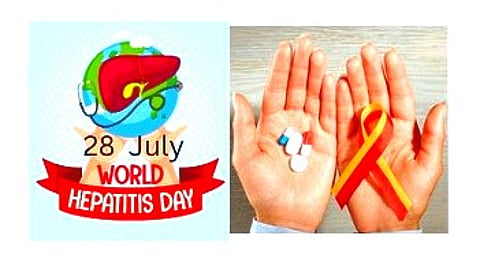

Chennai facing a silent rise in Viral Hepatitis Infections
Chennai could be facing a silent rise in hepatitis infection cases. According to the press release, a staggering 3% of over 60,000 people screened at Government Stanley Medical College Hospital in the past 18 months tested positive for Hepatitis B. This silent killer can lead to severe liver damage, cirrhosis, and even cancer.
According to the data from the hospital, 60,544 people were screened between January 2023 and June 2024, out of which 1,713 people tested positive for Hepatitis B and 350 tested positive for Hepatitis C. Also, out of 18,056 blood donors screened, 120 tested positive for Hepatitis B and 20 for Hepatitis C. Under the high-risk category, as many as 19,896 individuals were screened and among them, 81 tested positive for Hepatitis B and 22 for Hepatitis C.
Viral hepatitis is an inflammation of the liver caused by a viral infection. There are five main types: Hepatitis A, B, C, D, and E. While they share the same name, they differ in how they spread, the severity of illness, and the treatments available.
Hepatitis A: Spread through contaminated food or water.
Hepatitis B: Spread through blood, semen, or other body fluids.
Hepatitis C: Spread through blood-to-blood contact.
Hepatitis D: Requires Hepatitis B infection to occur.
Hepatitis E: Spread through contaminated water or food.
Many people with hepatitis have no symptoms, but when they do, they can include:
Fatigue
Nausea and vomiting
Abdominal pain
Jaundice (yellowing of the skin and eyes)
Dark urine
Light-colored stools
Joint pain
Know why you are at risk!
Hepatitis can spread in multiple ways:
Blood and Body Fluids: Hepatitis B spreads through contact with infected blood, semen, or other body fluids.
High-Risk Groups: People who share needles (primary source of the spread of hepatitis C virus), unprotected sex, or have multiple sexual partners.
Mother to Child: The virus can even be transmitted from infected mothers to their babies during childbirth.
Additionally, Hepatitis A spreads through contaminated food and water, and close personal contact with an infected person.
Why Hepatitis infection can be dangerous?
Though Hepatitis A is self-limiting, Hepatitis B causes serious problems like liver cirrhosis and cancer. And Hepatitis C can lead to chronic liver infection. Vaccination is crucial in preventing the infection. People should be aware of what viral Hepatitis is and how to prevent it.
Dr B Sumathy, head of the Medical Gastroenterology Department, at Stanley Medical College Hospital.
How you can protect yourself!
Vaccination: There are 5 types of viral hepatitis (a liver infection caused by viruses) -- A, B, C, D and E. Although vaccines are safe and effective, currently they are available only for hepatitis A and B viruses. Vaccination is crucial in preventing the infection as per Dr B Sumathy, head of the Medical Gastroenterology.
Safe Sex: Practice safe sex to prevent transmission.
Clean Needles: Never share needles or syringes.
Regular Checkups: If you're at high risk, get regular blood tests.
Prevention methods vary depending on the hepatitis type.
Vaccination is available for hepatitis A and B. Practicing safe sex, not sharing needles, and proper food handling can also help prevent infection.
Treatment options depend on the type of hepatitis and the severity of the infection. Some people may need antiviral medications while advanced cases benefit from liver transplantation.
Stanley Medical College Hospital is leading the charge
Stanley Medical College Hospital is leading the charge against Hepatitis. They've vaccinated over 12,000 people and are treating 800 Hepatitis B and 300 Hepatitis C patients. The government is also stepping up with a vaccination drive for healthcare workers in addition to vaccinating 9.2 lakh children annually.
Early detection and treatment are crucial for managing hepatitis and preventing complications such as liver cirrhosis and cancer.
Don't Ignore the Symptoms!
Hepatitis B often shows no symptoms. Early detection is key. Get tested and vaccinated today and protect yourself and your loved ones.
(Input from various sources)
(Rehash/Dr. Aditi Bakshi/MSM)
